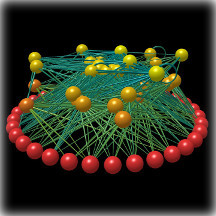 User Portlet
User Portlet

I am a mathematical biologist working as a postdoctoral fellow at the Tulane/Xavier Center for Bioenvironmental Research. I have a Ph.D. in Applied Mathematics from the University of Arizona, and my research is at the interface of mathematics, ecology, and evolutionary biology. I use networks, differential and difference equations, and large-scale stochastic simulations to explore patterns of diversity and abundance that arise in natural ecosystems.
Biological systems at any scale are complex systems. Despite the great complexity involved in the interactions at and between the physiological level, the organismal level, the population level, we see patterns of abundance and species richness, or diversity arise through time. Tools such as evolutionary game theory and networks can be used to offer powerful insight into how such patterns arise. For example, using our understanding of how ecological predator-prey systems work, we can model the flow of energy through an ecosystem using a the idea of a food web, which is a network representing who eats whom in an ecosystem. Each organism has a population size that changes through time due to its interactions, and on a longer time scale, individuals adapt and evolve. By combining dynamical systems, evolutionary game theory, networks, and large-scale computational simulations, I have been working to "evolve" model food web networks to observe how systems resembling those we see in nature can emerge through time. Below is an example of a small model food web. The nodes represent species and the links represent a predatory interaction. Species at the bottom of the network represent primary producers (e.g. plants), which are eaten by species at higher trophic levels.

In addition to this ongoing study of evolving ecosystems, I also use models to explore
- patterns of species abundance in competitive ecological communities
- the evolution of competition and cannibalism in flour beetles, and
- disease risk in coupled natural and human systems through the movement of rodents in an urban landscape.
I have used Mathematica in analyzing and developing small-scale models, and I am very interested in exploring other Wolfram products such as Wolfram|Alpha Pro and Wolfram Cloud Credits to and advance visualization efficacy and analyze simulation and observational data in collaboration with remote colleagues.
